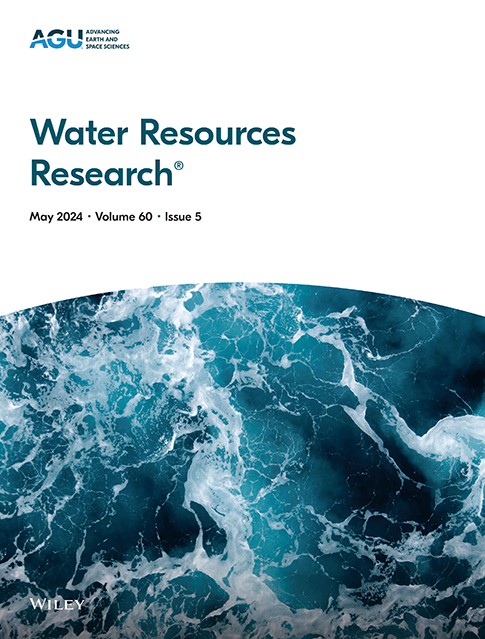根据 ADCP 重复断面数据估算潮汐和潮下流场的物理信息
IF 5
1区 地球科学
Q2 ENVIRONMENTAL SCIENCES
引用次数: 0
摘要
声学多普勒流廓仪(ADCPs)是观测河流、河口和沿海海洋流场的全球标准设备。迄今为止,将河流流量、潮汐和大气强迫控制的平均流场与小尺度湍流、定位不精确、多普勒噪声和错误的后向散射分离开来仍然是一项劳动密集型的挑战。在这里,我们介绍了一种通用的新方法,将原始船载ADCP样带数据与连续性和平滑性约束相结合,以更好地估计任何类型开放水体中的湍流平均三维流速。物理约束通过广义Tikhonov正则化以可变的相对重要性强制执行。我们证明,在复杂的河口水流中,通过测试该方法的泛化能力和对湍流和测量噪声的鲁棒性,该程序可以比纯粹基于数据的方法更可靠地估计潮汐振幅、相位及其梯度。对质量守恒和对各种噪声的鲁棒性的增强使得对雷诺平均流量分量的估计更加可靠和可验证,随后,对Navier-Stokes方程中的项的估计也更加可靠。本文章由计算机程序翻译,如有差异,请以英文原文为准。
Physics-Informed Estimation of Tidal and Subtidal Flow Fields From ADCP Repeat Transect Data
Acoustic Doppler current profilers (ADCPs) are a global standard in observing flow fields in rivers, estuaries and the coastal ocean. To date, it remains a labor intensive challenge to isolate mean flow fields governed by river discharge, tides and atmospheric forcing on the one hand, from small-scale turbulence, positioning imprecision, Doppler noise and erroneous backscatter, on the other hand. Here, we introduce a generic, new method of combining raw shipborne ADCP transect data with continuity and smoothness constraints to obtain better estimates of turbulence-averaged three-dimensional flow velocities in any type of open water body. The physical constraints are enforced with variable relative importance via generalized Tikhonov regularization. We demonstrate that in complex estuarine flow, this procedure allows for more reliable estimates of tidal amplitudes, phases and their gradients than what is possible with a purely data-based approach, by testing the method's generalization capabilities and robustness to turbulence and measurement noise on a data set retrieved at a tidal channel junction. The increased adherence to mass conservation and robustness to noise of various kinds allows for more reliable and verifiable estimates of Reynolds-averaged flow components, and subsequently, of terms in the Navier-Stokes equations.
求助全文
通过发布文献求助,成功后即可免费获取论文全文。
去求助
来源期刊

Water Resources Research
环境科学-湖沼学
CiteScore
8.80
自引率
13.00%
发文量
599
审稿时长
3.5 months
期刊介绍:
Water Resources Research (WRR) is an interdisciplinary journal that focuses on hydrology and water resources. It publishes original research in the natural and social sciences of water. It emphasizes the role of water in the Earth system, including physical, chemical, biological, and ecological processes in water resources research and management, including social, policy, and public health implications. It encompasses observational, experimental, theoretical, analytical, numerical, and data-driven approaches that advance the science of water and its management. Submissions are evaluated for their novelty, accuracy, significance, and broader implications of the findings.
 求助内容:
求助内容: 应助结果提醒方式:
应助结果提醒方式:


